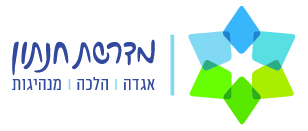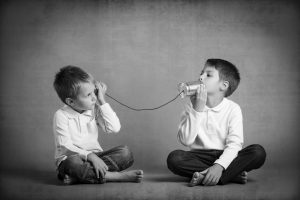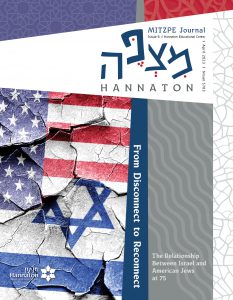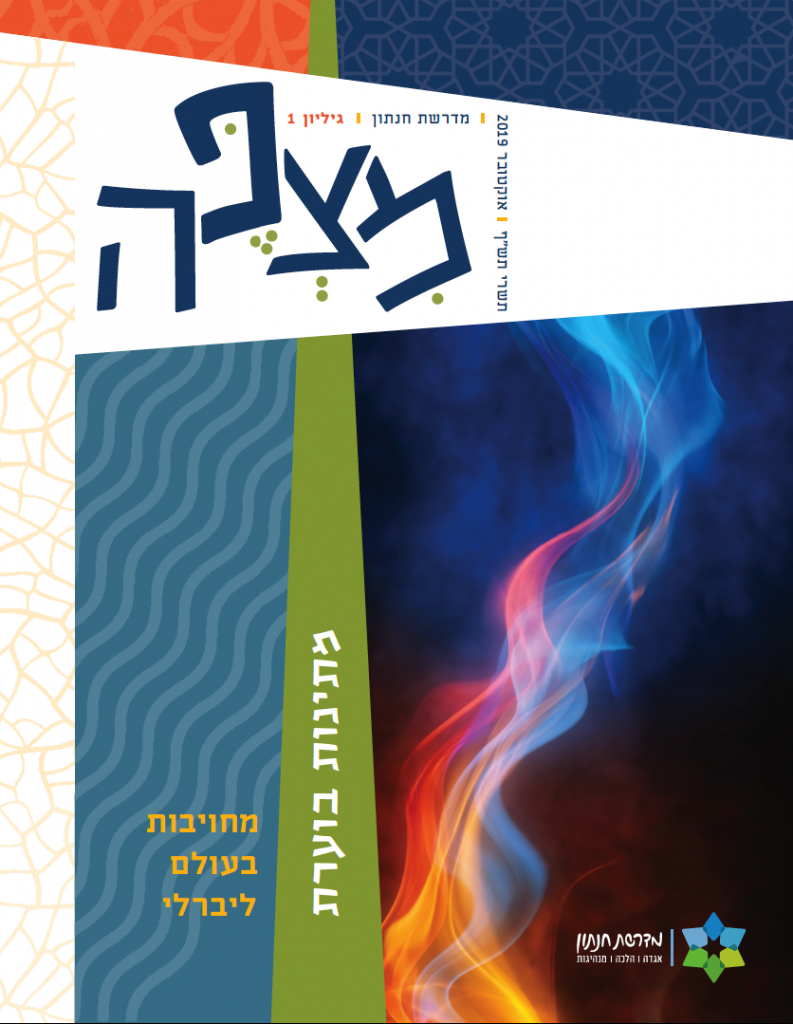For three years now, a group of American rabbis from across the denominational spectrum has gathered for learning in Israel and a seminar in the USA. Three Israelis, graduates the Beit Midrash for Israeli Rabbis, also took part in the program. I met with them for a conversation about the encounter and about the challenges – shared and different – faced by the two great centers of Jewish life.
The Rabbinic Leadership Initiative (RLI) program takes place at the Shalom Hartman Institute. It includes group learning, lectures by prominent figures in Israel, tours of Israel, and countless conversations between the participants.
The participants in the conversation that follows were:
Rabba Hadas Ron-Zariz, from Kibbutz Yifat. Hadas leads the Yifat b’Ruach community in northern Israel, and is among the founders of the Midrasha at Oranim. She teaches pastoral care and community support.
Rabbi Tzvika Graetz, from Jerusalem. Tzvika is the rabbi of the Hod ve-Hadar community in Kfar Saba. Previously, he served as the CEO of Masorti Olami. He was ordained by the Conservative Movement, the Beit Midrash for Israeli Rabbis, and Beit Midrash Har’el.
Rabba Dotan Arieli, from Shaar Haamakim. Dotan is a group facilitator on topics of Jewish identity and gender at the Midrasha at Oranim and the Kolot Beit Midrash. She is the head of pedagogy and an educator for the Kibbutz Movement’s Kazeh Re’eh Vehadesh program.
First of all, tell us about one meaningful and eye-opening experience that you had during the program.
Hadas: This group led to many meaningful experiences for me – mostly by getting to know each other, which allowed me a peek into worlds both like and very much unlike ours. One of these experiences happened during Operation Guardian of the Walls. The night the operation began, we – Dotan, Tzvika and I – wrote in the program’s shared WhatsApp group, trying to describe what was happening, each of us from our own perspective. We felt that the Americans stood with us, were worried for us, and wanted to understand, but that there was also a certain distance. This experience repeated itself in various ways over the course of our years together, whenever important things happened to them or to us.
Another experience was during the pandemic. Covid made clear to me both the similarity and the differences between us. Because it was a universal, worldwide pandemic, there was an expectation that the boundaries between us would break down and we would discover the deep similarities we shared. It’s true that we had a mutual sense of worry for each other, but I felt that we went through different experiences. Maybe the differences came from the fact that they were responsible for many other people in their communities, because while Israel is a small country, Covid was a problem felt on a nationwide, and not only on a community, level. So there was a dramatic difference in the ways we coped with the pandemic.
It turns out that we live in different cultures. With all the closeness and the love we share, and the mutual appreciation – at the end of the day, they’re busy with their own lives, and we’re busy with ours. We’re very Israeli, even putting aside our Jewishness, and they are very American Jewish.
Tzvika: For me, as an Israeli, it was an interesting experience to walk through the streets of Jerusalem next to an important and influential American rabbi of Korean ancestry. People around me didn’t know who she was. They thought that she was from Korea, maybe pro-Israel… No one imagined that she was one of the most influential rabbis in liberal American Jewry. Or when we went with them to Hebron, Israelis tried to educate them or explain things to them, not imagining that each of these rabbis serves as a leader for thousands of people. In Israeli society, no one even recognizes them, which attests to the extent of the disconnect between American and Israeli Jewry.
The same thing was true the other way around. The Americans weren’t familiar with extremely influential figures in Israeli society. For example, here, it was a huge story when Rabbi Eliezer Melamed, a well-known and very conservative Orthodox rabbi and a settler, met with a female Reform rabbi. It almost didn’t interest them at all. They didn’t understand how big a deal it was in Israeli society.
I’ve always been optimistic, but I saw firsthand that it was very hard to work on the connection between us. In my opinion, our worlds have gone different ways, well beyond the cultural differences. Now, I’m worried that we just won’t be able to connect. There’s a disconnect. Today, we should be asking, “Where is our relationship going?” – What are we going to do about it?
It sounds like the encounter led to pessimism, not the optimism that I would have expected. Do you think the disconnect comes from a lack of familiarity with what’s happening in Israel? Or maybe they don’t want to understand, or can’t understand – maybe because of their political views? How would you explain it?
Tzvika: The discourse is post-Zionist in the best of cases, a discourse cut off from the Zionist ethos held by most Israelis today. After 30 years of working in the field of Israel-Diaspora relations, I feel that we’ve lost large swaths of the Diaspora.
In your impression, what are the questions that the American Jewish leadership is most concerned with?
Tzvika: They are very concerned with the political issue of the Israeli-Palestinian conflict. Most have adopted a narrative dictated by a minority of Israelis, according to which Israel is an oppressor and a conqueror, and the Jewish people has failed the test of sovereignty. As I understand it, they’re also committed to this narrative because they can’t let themselves be identified with the American right.
They’re also very much absorbed in the question of Jewish education. It seems to me that aside from a few excellent – and very expensive – private Jewish schools, Jewish education has failed in America, and Judaism there is on its deathbed. Jewish education requires tremendous resources, and even when they have those resources, it doesn’t ensure Jewish continuity. Here, by contrast, there is the potential for a Judaism that’s alive and kicking. We have a free education system, not to mention public services like universal health care. Our vibrant Judaism finds its expression in the flourishing of pre-army academies, among other things. A Jew can be fully a Jew when he lives in his land. I admire them for the choice they make every day to be Jewish, without throwing up their hands – to be a Jew outside of Israel is not an easy sacrifice to make. They try to hold onto Judaism with all their might and with all the money available to them, and it’s slipping through their fingers. It’s a great tragedy. When they understood that they couldn’t fight rising assimilation, they practically stopped asking people to convert, and welcomed everyone as they were with open arms. In this way, the stable, familiar Jewish family is disappearing.
Recently, they’ve also had to deal with antisemitism from the right and left, and with all the security issues that come with that. And they’re asking themselves questions about political identity, identification with Israel, and so on.
Hadas: There are issues in Israel that aren’t relevant to their lives and don’t really interest them. And we’re also not that interested in what’s happening there. The question of Judaism in America is a very serious question. They’re dealing with assimilation, with Jewish education that’s becoming less deep and meaningful. They’re like the finger in the dike.
Most of American Jewry can be split into two factions – they’re either right-wing and Zionist, or they’re left-wing and post-Zionist. These rabbis have to live with complexity all the time, also when it comes to Israel. Sometimes it seems that they’re the last ones left who haven’t made an either-or choice, who insist both on a liberal Jewish outlook and on a connection to Israel. From that perspective, I feel similarly to them, as I share the Beit Midrash for Israeli Rabbis’ view of complex leadership and complex Zionism. I identify with their struggle not to let go of Israel, even if sometimes they wish they could.
They are my partners, and my friends’ and colleagues’ partners, in trying to hang on to the complexities of a Zionist left and a pluralistic Judaism. This is exactly why our role is to strengthen the connection between us. They make us stronger, and we make them stronger.
In your eyes, why is it important for encounters like these to take place?
Dotan: It’s important to meet for a serious, extended encounter. There were some figures in the group who showed me how to hold complex and ostensibly contradictory positions. Of course, it’s hard for them to understand the complexity I live in – as an Israeli, a Zionist, and a liberal, with children living here and serving in the army. They can be in conversation about this with me and with all of us. This is a conversation that gives me strength. The encounter is important and empowering for me. Whether there’s criticism or support – the conversation and the deep sharing are important.
Hadas: They broaden my horizons and “force me” to see and confront things that I don’t see or avert my eyes from. I’ll give an example: I didn’t go to Hebron for many years, and I tried to avoid going. Maybe I wanted to bury my head in the sand. American Jews visit Hebron much more often than Israelis, and certainly more than left-wing Israelis. The paradox is that thanks to the program, I made it there and I saw the complicated situation. There’s something in their perspective, the dialogue with them and their view from the outside – which is at the same time very familiar and empathic – that expands my own way of looking at things. During Operation Guardian of the Walls, we talked to them about the complexity of army service and about our hopes for peace and the preservation of human rights. This is the complexity we live in, this is our struggle, and I want North American Jews to share in it with me. The fact that they made an effort to come to Israel during the war gave me a feeling that the conflict doesn’t just belong to us in Israel; it’s also theirs. I began to feel that this community of rabbis was a unique group that could see reality, with all its challenges, and feel responsibility toward one another. We’re brought together by our insistence on always hearing another perspective from other people.
Tzvika: On a personal level, I enjoy meeting with them, and I’ve built deep and meaningful friendships with dear friends. But I served as the CEO of Masorti Olami for ten years, I worked a lot with Diaspora Jewry and specifically American Jewry, I was an ambassador for the Jewish Agency. The subject of the Diaspora was very close to my heart. I wrote, I developed curricula. I dedicated and still dedicate my life to the field – and I believed in it. Today, I believe in it less.
Today, they operate from a universalistic view of Judaism, and in my opinion this will lead to the end of an authentic Judaism connected to its roots. I’m sorry to say that I think Judaism in the Diaspora has a time limit. We have a responsibility to make sure that they don’t disappear, to make sure that everyone who can make aliyah does, to protect the leadership. We have to bring them to a place where they can live and develop their Judaism so that we, pluralistic Jews in Israel, will be a more significant presence or even a majority.
Dotan: The ongoing conversation between equals, between peers, creates intimate, close contact with American Jewish leaders. It creates a connection on an individual, social level, on a professional level, and on a moral level. In this way, a strong, educational connection is formed – a true partnership.
Is there something that we Israelis can learn from them?
Tzvika: We can learn from them about the choice to be Jewish, and about building quality institutions like their excellent, creative schools.
The connection to them is important to me simply because they are my brothers and I am responsible for them. I don’t need them in the same way that they need us. I need them to build pluralistic Judaism in Israel.
Hadas: Our three years of learning together created a close partnership. From them, I’ve learned a profound sense of responsibility for the Jewish people. I also appreciate their willingness to lead large, complex communities of people with different needs, and to be there, on the front lines, out of a powerful sense of mission. I’m happy that we’ve built a friendship that allows us to learn from one another, out of a desire to learn about ourselves through their loving and critical eyes. Thus, I can hear their opinion about what goes on here in Israel, and I don’t feel any need to condescend or correct.
When someone from the group comes to Kabbalat Shabbat in my community, or quotes a dvar Torah of mine in his or her community – we draw on each other as spiritual and intellectual partners, and our world gets a little bigger.
And what did they learn from you? What’s the advantage of having them come here, not just learn it all there?
Dotan: It’s important to note that the program is directed at the American religious leadership. We’re only three Israelis among 30 participants, so the interaction wasn’t always mutual.
They think about the deliberations and challenges in our lives within their political and cultural contexts. Today, after three years, they have gotten from us a more complex understanding of Israeli society, and of course friendship, love, and encouragement.
Hadas: To build a beit midrash of people who are different from one another – that takes effort. There’s a value to an ongoing connection with American Jewish leaders, one that isn’t built on short seminar programs that remain at the level of small talk. An ongoing, personal encounter builds trust, and so they can listen to us on issues that are politically controversial in Israel. We talk about the dilemmas in our lives in a deep, complex way, and we don’t use stereotypes to talk about conflicts. We discuss the challenges faced by the Jewish renewal movement in Israel, or about left and right, from each of our perspectives. From meeting with us, they get to know another angle on Judaism. That said, sometimes I feel that it’s a challenge to really convey to them the experience of life in the Jezreel Valley, or issues of Jewish pluralism in Israel.
All of us deal with Jewish renewal in the Israeli sense, from within the well-known dichotomy of religious and secular. Do you think that the question of Jewish education is something we have in common, a point of connection? Can the two communities help one other in these areas?
Tzvika: I’m not sure that our work on Jewish renewal is so similar. The Israeli community that I work with is looking for an authentic connection to text because this is a connection to their past, to the language they speak, and to the land they live in. I got the sense that my American partners immediately try to connect the texts to the present day, so that Torah study will feel relevant and speak to a Jew living in the Diaspora, far from the Hebrew language and the Land of Israel. They also spend more time on progressivism. In Israel, we don’t spend as much time on that.
Dotan: I think that we have a lot in common on the question of Jewish education – how do you teach pluralistic Judaism, how do you create a diverse Judaism, how can you make room for every authentic and honest Jewish voice? How do you incorporate modern values – progress, gender equality, democracy, sovereignty, and so on – into Jewish life? We can definitely help and support one another in those and other fields in order to get to know the various perspectives and become inspired by one another. Together, hopefully, we’ll be able to create a Jewish language suited to modern life, to the 21st century, to a time with a strong Israel and a strong Diaspora.
Hadas: The connection between Israeli and American Jewry is like a romantic relationship. When we first got to know liberal American Jewry over 20 years ago, it was like falling in love. We discovered something new, and we learned all kinds of new ways to express our Judaism. Today, the infatuation has developed into a serious relationship. We’ve decided to stay together and nourish each other. I want to continue my connection with these leaders, the complex ones, the ones who aren’t extreme, the ones who want to come and visit me in Israel, who don’t want a divorce from me. Then the question of what I receive and what I give becomes much more complicated. It’s a partnership, not a hierarchical relationship between one person who knows and one who doesn’t. I believe that we also enrich them.
Tzvika: I’ll use Hadas’ lovely metaphor of a relationship, and say that today I’m looking for a “new relationship.” The current relationship, which I worked to build for so many years, is between two people who can’t be together. They’re not in the same territory, they’re not in the same house, they’re divorced parents raising their kids – the Jewish people – together. It’s a sort of frigid Ashkenazi relationship [he adds with a smile]. I’m looking for a new relationship, here in the streets of Israel. I’m looking for settlers, Mizrahim, ex-Soviet immigrants. We need to leave the familiar liberalism of our American brothers, because it prevents us from delving deeper into Israeli society.
Hadas: It’s important for me to make my world a little bigger all the time. We’re partners, and we’ll talk to them. We won’t bring them “Judaism,” we’ll just meet them. The challenges of American Judaism don’t contradict the things that need to happen here in Israel. You, Tzvika, grew up with them and now you’re moving on. My process has been the opposite – I grew up on the “negation of the exile,” and today I have a different view of American Jewry. It’s obvious to me where my own center is, but in order to make my own home important, I need to encounter other possibilities.
Dotan: A connection with them doesn’t contradict an ability to work from the inside. We can use the image of two homes for the Jewish people. These are two homes that may not occupy the same territorial space, but that share history, a story, sentiment, culture, commitment, love. Each one has a world of its own. We have to ask ourselves how to make sure that external connections don’t threaten the central, intimate connection within these homes, but rather deepen it.
When the conversation came to an end, I was left with new ideas about a possible connection between pluralistic Israeli leadership and American Jewish leadership – a connection that doesn’t draw its strength from specific controversial issues or even agreement between us, but rather from the kind of relationship that we want to establish, and the methods of communication that we can use to promote the relationship.





